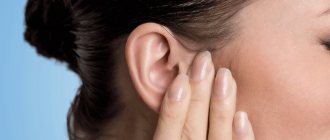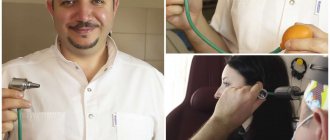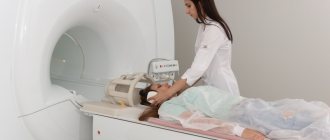Causes
The reasons that lead to this phenomenon can be different - from infections and inflammations to allergic reactions. It can also be caused by a foreign body getting into the ear. Anemia, high blood pressure, and other illnesses (including something as serious as Meniere's disease, a swelling of the inside of the ear canal) can cause a person to experience a humming, buzzing, or squeaking sound. Also, similar sensations can be caused by the use of alcohol and drugs, large doses of caffeine and certain medications. Sometimes tinnitus can occur after stress or loud noise. Excessive earwax can also cause tinnitus.
Symptoms of tinnitus
If a person experiences a buzzing, humming, ringing or squeaking sound, as well as hissing, whistling or clicking noises that have no actual sound source, then they may have a disorder called tinnitus. The strength of this noise may vary. Sounds may be felt in one ear or heard in both. Tinnitus may be accompanied by other symptoms, the most common of which are:
- Headache
- Severe weakness
- Confusion, dizziness
- Nausea and vomiting
- Increased body temperature
- Discharge from the ears and discomfort in them
- Sudden changes in blood pressure
What to do and how to deal with this unpleasant symptom?
Noise or ringing in the ears with VSD is a reason to consult a doctor to rule out the possibility of organic pathology. The presence of additional symptoms and progression of disorders most often indicate the formation of diseases of the ear or nervous system.
Treatment tactics for this symptom in VSD include:
drug (pharmacological) therapy with antidepressants or tranquilizers: Clonazepam, Amitriptyline;- cognitive and behavioral correction aimed at distracting the patient from subjective noise and setting him up for positive thinking, concentration and relaxation;
- sound therapy uses the sounds of the natural environment (the sound of water, wind, rain) to reduce the sensitivity of neurosensory cells to somatic vibrations;
- music therapy is a desensitization method (reducing sensitivity) that masks tinnitus and other unpleasant sensations;
- massage and stretching of the masticatory muscles is a special exercise that relieves not only tinnitus, but also headaches and dizziness.
The greatest effect is achieved by a combination of methods against the background of changing the patient’s lifestyle and avoiding trigger factors.
Treatment for tinnitus
As soon as the diagnosis is made, treatment must begin immediately. Lack of proper treatment for this disease can have a serious impact on the patient's life. The constant unpleasant sounds that he experiences interfere with normal sleep and rest, prevent him from working, lead to a state of constant stress and can even cause depression.
After a medical examination, treatment for the disorder (or underlying disease) is prescribed. Usually, in order to eliminate the symptoms, it is enough to take special medications that eliminate inflammation. But sometimes surgery may be required if a specialist deems it necessary.
If this disorder is not treated, the consequences can be very tragic - tumors and infections can lead to complete hearing loss and other serious disorders. It is important that the patient does not self-medicate, but consults a specialist in connection with tinnitus.
Causes of headaches and tinnitus
It is important to determine the cause of the headache. If it is accompanied by noise, there are two types of it: objective and subjective. The first option is the one that is heard not only by the patient, but also by the doctor during the examination. It can be created by blood vessels, the muscles of the middle ear, the auditory tube, and also appear due to improper functioning of the temporomandibular joint. Subjective noise is heard only by humans; it is not detected during examination.
Diseases of the ENT organs
One of the common reasons for headaches and tinnitus is diseases of the ENT organs. They can occur due to hypothermia, exposure to viral and bacterial infections, as well as due to injuries and congenital abnormalities of the structure of organs. As a result of diagnosis, various diseases can be detected that require an individual approach to treatment.
- Otitis is an inflammation of the ear. The disease is accompanied by pain in the head and ear, as well as noise and buzzing in the ears, and hearing impairment. In the initial stages, symptoms may be nonspecific and include only hearing impairment and noise in the head. Otitis media is the most dangerous, since the inflammatory process can spread to the membranes of the brain. Another characteristic symptom is the appearance of discharge from the auditory canals.
- Blockage of the auditory canals is accompanied by hearing impairment, headaches, noise and deterioration of well-being. It can be caused by cerumen plugs, which appear as a result of improper ear hygiene or increased sulfur production. Also, during diagnosis, foreign objects may be detected in the ear canals.
- Meniere's disease is a specific disease in which the amount of fluid in the labyrinth of the ear increases. This organ is located in the inner ear and not only performs the auditory function, but is also responsible for balance. If the volume of free fluid exceeds the norm, the patient experiences headaches, tinnitus, dizziness, nausea and other symptoms.
- Neoplasms are detected as a result of a comprehensive diagnosis of ENT organs. Their danger is determined by their type and size, and the need for surgery is determined by the doctor.
Diseases of the ear and ENT organs require timely diagnosis and treatment. If they progress, there is a possibility of infection or inflammation spreading to neighboring structures, including the lining of the brain.
Vascular diseases
Tinnitus is often associated with pathologies of the vascular system. It is caused by improper blood circulation through the arteries, which can cause oxygen starvation of brain cells. This causes dizziness, tinnitus, a sharp deterioration in health, and over time can also provoke a stroke.
During diagnosis, the following disorders may be detected:
- atherosclerosis (main article: Headache as a symptom of atherosclerosis) is a disease that is manifested by the deposition of cholesterol and some fractions of lipoproteins on the inner walls of blood vessels, the formation of plaques and blood clots;
- hypertension (main article: Headache in hypertension) is a chronic disease in which there is a frequent increase in blood pressure, which over time leads to stretching of arterial walls, slowing blood circulation and deteriorating oxygen supply to brain cells;
- stenosis (narrowing) of the lumen of the vertebral and carotid arteries, which directly provide blood supply to the brain.
If you suspect vascular disease, it is important to undergo examination by a cardiologist. These disorders can be caused by heart pathologies, congenital or acquired defects. For chronic diseases of the cardiovascular system, it is important to periodically contact a specialist for routine examinations.
Diseases of the cervical spine
Main article: Headache with cervical osteochondrosis
The cervical spine contains important vessels that carry blood to the brain. Normally, they pass through holes in the vertebrae, thereby being protected from mechanical damage. However, in a number of diseases, arteries are compressed by surrounding tissues, and oxygen access to brain cells is impaired. As a result of a comprehensive examination, the following disorders can be diagnosed:
- osteochondrosis is a chronic disease in which slow destruction of the tissues of the vertebrae and intervertebral discs occurs, as well as compression of the arteries and spinal nerve roots;
- intervertebral protrusions and hernias - pathological protrusion of cartilage, which leads to acute pain, limited mobility of the upper limbs, as well as tinnitus, hearing impairment and other symptoms;
- injuries and their consequences - with improper rehabilitation, as well as in the presence of serious injuries, symptoms may appear after a long time.
Treatment of diseases of the cervical spine depends on their type and stage. Your doctor may prescribe exercises to do at home, painkillers, anti-inflammatory medications, and muscle relaxants. However, some diseases may require surgery - it is prescribed for large hernias, comminuted fractures and other pathologies.
Migraine
Migraine is a primary headache. It is not caused by pathologies of any organs, and its origin is associated with vascular or nervous factors. There are several stages in the development of migraine, one of which is aura. In most patients, it appears several hours before a headache attack and includes the following symptoms:
- dizziness, tinnitus, auditory hallucinations;
- blurred vision, lacrimation, exacerbation of reaction to bright light;
- nausea, sudden deterioration in health;
- mood swings.
Migraine may first appear in both childhood and adulthood. Its attacks occur with a certain frequency and may be associated with changes in weather conditions or atmospheric pressure, or moving to a different climate zone. In addition, migraines can manifest themselves against the background of stress, nervous tension, and disruption of sleep schedules.
Other reasons
Headache and tinnitus are typical manifestations of many conditions. When they appear, it is important to undergo a full examination, since they can indicate both minor disorders and dangerous pathologies. Thus, as a result of diagnostics, the following changes may be detected:
- hypoglycemia – a decrease in blood glucose levels, which is typical for diabetes mellitus;
- intense physical activity without sufficient rest, which leads to deterioration of blood supply to the brain (main article: Headaches during exercise);
- inflammatory diseases, thyroid neoplasms;
- pathology of the temporomandibular joint.
A similar symptom complex can develop with prolonged use of certain medications. These include steroidal anti-inflammatory drugs and chemotherapy drugs. If headaches and tinnitus go away with rest, they do not indicate serious pathologies.
Our specialists
Tarasova Svetlana Vitalievna
Expert No. 1 in the treatment of headaches and migraines. Head of the Center for the Treatment of Pain and Multiple Sclerosis.
Somnologist.
Epileptologist. Botulinum therapist. The doctor is a neurologist of the highest category. Physiotherapist. Doctor of Medical Sciences.
Experience: 23 years.Derevianko Leonid Sergeevich
Head of the Center for Diagnostics and Treatment of Sleep Disorders.
The doctor is a neurologist of the highest category. Vertebrologist. Somnologist. Epileptologist. Botulinum therapist. Physiotherapist. Experience: 23 years.
Palagin Maxim Anatolievich
The doctor is a neurologist. Somnologist. Epileptologist. Botulinum therapist. Physiotherapist. Experience: 6 years.
Zhuravleva Nadezhda Vladimirovna
Head of the center for diagnosis and treatment of myasthenia gravis.
The doctor is a neurologist of the highest category. Physiotherapist. Experience: 16 years.
Mizonov Sergey Vladimirovich
The doctor is a neurologist. Chiropractor. Osteopath. Physiotherapist. Experience: 8 years.
Bezgina Elena Vladimirovna
The doctor is a neurologist of the highest category. Botulinum therapist. Physiotherapist. Experience: 24 years.
Drozdova Lyubov Vladimirovna
The doctor is a neurologist. Vertebroneurologist. Ozone therapist. Physiotherapist. Experience: 17 years.
Dyachenko Ksenia Vasilievna
Head of the center for the treatment of dizziness and balance disorders.
The doctor is a neurologist of the highest category.
Angioneurologist. Neurorehabilitation specialist. Physiotherapist. Candidate of Medical Sciences.
Experience: 19 years.Volkova Svetlana Anatolevna
Head of the Center for Parkinsonism and Extrapyramidal Diseases.
The doctor is a neurologist of the highest category. Epileptologist. Ozone therapist. Physiotherapist. Experience: 26 years.
Treatment of headaches and tinnitus
To treat headaches, the doctor prescribes a regimen, which may include conservative methods or surgical intervention. For acute pain, you can take painkillers, but they will not affect the underlying cause. For different diseases, the following methods may be required:
- for hypertension - blood pressure correction agents, diuretics, medications to support heart function;
- for diseases of the cervical spine - therapeutic exercises, painkillers and muscle relaxants;
- specific treatment of ENT organs;
- diet for high cholesterol levels, diabetes mellitus;
- drugs for the treatment of migraine.
If possible, the doctor will prescribe medications to take at home. However, if surgery is necessary, it is recommended that the operation be performed as scheduled. The effectiveness of treatment depends on a well-chosen regimen, as well as on following all recommendations at home: diet, exercise, and others.
Read also
Fainting
Attacks of dizziness and fainting are pathological conditions that occur when the body overreacts to certain triggers, such as extreme emotional...
Read more
Vestibular paroxysmia
Attacks of systemic dizziness lasting several seconds, less often minutes, and are accompanied in most cases by tinnitus and hearing loss. Seizures often occur during hyperventilation...
More details
Dizziness
If a person feels that “the ground is starting to disappear from under his feet” or there is a feeling of instability, unsteadiness, or lack of coordination, they say that dizziness or vertigo occurs. There are central...
More details
Meniere's disease
Meniere's disease is a disease in which the leading symptoms are systemic dizziness, accompanied by hearing loss, a feeling of fullness and tinnitus. Paroxysmal dizziness,…
More details
Kinetosis/motion sickness-motion sickness
Occurs when driving in a vehicle, ship or carousel. It begins with malaise, fatigue, yawning and pale skin, then mild dizziness occurs, followed by cold...
More details
Causes of noise and ringing in the ears with VSD
As medical statistics show, a huge number of people experience chronic tinnitus, especially in adulthood. And not everyone has a diagnosis of VSD or neurosis. Noise or ringing in the ears in itself is not a disease. This is a consequence of vascular dysfunction. But what disrupts their work - there are a lot of reasons. Many factors can provoke such auditory effects: inflammatory processes in the body, intoxication, chronic diseases, allergies, diseases of the blood and cardiovascular system, osteochondrosis. This is just a basic list of reasons.
In most cases, VSD workers do not have any serious diseases. Doctors, listening to the suffering and complaints of the unfortunate neurotic, for some reason do not pay special attention to this symptom and try to get rid of it with “standard” phrases and standard medications. But such doctors and treatment do not satisfy the dystonic patient and he continues to suffer.
The cause of noise and ringing in the ears with VSD in 90% of cases is weak blood vessels. Due to an unstable nervous system, they have to either spasm strongly or relax too much. As a result, they lose tone and elasticity and become flabby. And being in this state, the vessels pump blood more slowly. The brain begins to experience oxygen starvation due to insufficient blood circulation. All this affects the functioning of the hearing aid.
The head can make noise during sudden changes in pressure, ascents or descents, on an airplane, when driving fast, or when bending sharply, which is a normal reaction of the body.
VSDeshniks are very sensitive people. They react to everything - weather changes, news on TV, physical activity. The blood vessels also begin to react chaotically. Very often, the sieve begins to bother dystonics during magnetic storms, during sudden climate changes, and during sudden physical movements.
Another common cause is osteochondrosis. Spinal discs compress nerve endings and blood vessels, even leading to imbalance in the circulatory system.
The stress that a person with vegetative-vascular dystonia experiences also greatly affects the state inside his head. Any nervous shock, fear, or experience intensifies the noise and ringing. Many people begin to hear their pulse in their ears. This frightens a person, he begins to get even more nervous. Naturally, this provokes new symptoms, including panic attacks. Often, in addition to tinnitus, a person experiences other related symptoms:
- Apathy, loss of strength.
- Rapid heartbeat (tachycardia).
- Irritability.
- A rush of heat to the face.
- Coldness of the extremities.
- Increased sweating.
- Dizziness.
- Darkening, cloudiness, spots before the eyes.
- Changes in blood pressure.
All these most unpleasant sensations become some kind of endless wheel: one thing replaces another, provoking a third. Is it worth talking about the depressed state the patient is in? It’s clear that a person does not live, but suffers endlessly from the tricks of his own nervous system.











